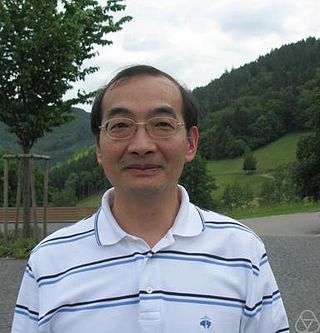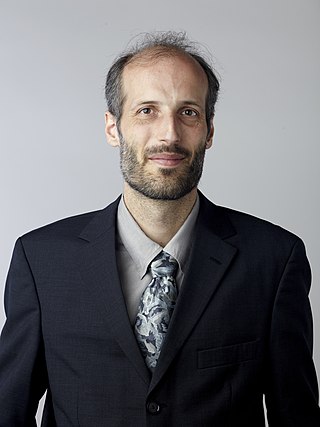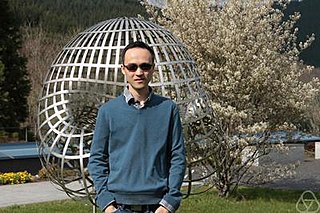The Clay Mathematics Institute (CMI) is a private, non-profit foundation dedicated to increasing and disseminating mathematical knowledge. Formerly based in Peterborough, New Hampshire, the corporate address is now in Denver, Colorado. CMI's scientific activities are managed from the President's office in Oxford, United Kingdom. It gives out various awards and sponsorships to promising mathematicians. The institute was founded in 1998 through the sponsorship of Boston businessman Landon T. Clay. Harvard mathematician Arthur Jaffe was the first president of CMI.

The Courant Institute of Mathematical Sciences is the mathematics research school of New York University (NYU), and is among the most prestigious mathematics schools and mathematical sciences research centers in the world. Founded in 1935, it is named after Richard Courant, one of the founders of the Courant Institute and also a mathematics professor at New York University from 1936 to 1972, and serves as a center for research and advanced training in computer science and mathematics. It is located on Gould Plaza next to the Stern School of Business and the economics department of the College of Arts and Science.

Yakov Grigorevich Sinai is a Russian-American mathematician known for his work on dynamical systems. He contributed to the modern metric theory of dynamical systems and connected the world of deterministic (dynamical) systems with the world of probabilistic (stochastic) systems. He has also worked on mathematical physics and probability theory. His efforts have provided the groundwork for advances in the physical sciences.
Mehran Kardar is an Iranian born physicist and professor of physics at the Massachusetts Institute of Technology (MIT), and co-faculty at the New England Complex Systems Institute (USA). He received his B.A. in physics from the University of Cambridge in 1979, and obtained his Ph.D. from MIT in 1983. Kardar is particularly known for the Kardar–Parisi–Zhang (KPZ) equation in theoretical physics, which has been named after him and collaborators. He was awarded a Guggenheim Fellowship in 2001.

Andrei Yuryevich Okounkov is a Russian mathematician who works on representation theory and its applications to algebraic geometry, mathematical physics, probability theory and special functions. He is currently a professor at the University of California, Berkeley and the academic supervisor of HSE International Laboratory of Representation Theory and Mathematical Physics. In 2006, he received the Fields Medal "for his contributions to bridging probability, representation theory and algebraic geometry."

Giorgio Parisi is an Italian theoretical physicist, whose research has focused on quantum field theory, statistical mechanics and complex systems. His best known contributions are the QCD evolution equations for parton densities, obtained with Guido Altarelli, known as the Altarelli–Parisi or DGLAP equations, the exact solution of the Sherrington–Kirkpatrick model of spin glasses, the Kardar–Parisi–Zhang equation describing dynamic scaling of growing interfaces, and the study of whirling flocks of birds. He was awarded the 2021 Nobel Prize in Physics jointly with Klaus Hasselmann and Syukuro Manabe for groundbreaking contributions to theory of complex systems, in particular "for the discovery of the interplay of disorder and fluctuations in physical systems from atomic to planetary scales."

Oded Schramm was an Israeli-American mathematician known for the invention of the Schramm–Loewner evolution (SLE) and for working at the intersection of conformal field theory and probability theory.

Horng-Tzer Yau is a Taiwanese-American mathematician. He received his B.Sc. in 1981 from National Taiwan University and his Ph.D. in 1987 from Princeton University. Yau joined the faculty of NYU in 1988, and became a full professor at its Courant Institute of Mathematical Sciences in 1994. He moved to Stanford in 2003, and then to Harvard University in 2005. He was also a member of the Institute for Advanced Study in Princeton, New Jersey, in 1987–88, 1991–92, and 2003, and was a distinguished visiting professor in 2013–14.

Sourav Chatterjee is an Indian mathematician, specializing in mathematical statistics and probability theory. Chatterjee is credited with work on the study of fluctuations in random structures, concentration and super-concentration inequalities, Poisson and other non-normal limits, first-passage percolation, Stein's method and spin glasses. He has received a Sloan Fellowship in mathematics, Tweedie Award, Rollo Davidson Prize, Doeblin Prize, Loève Prize, and Infosys Prize in mathematical sciences. He was an invited speaker at the International Congress of Mathematicians in 2014.

Sir Martin Hairer is an Austrian-British mathematician working in the field of stochastic analysis, in particular stochastic partial differential equations. He is Professor of Mathematics at EPFL and at Imperial College London. He previously held appointments at the University of Warwick and the Courant Institute of New York University. In 2014 he was awarded the Fields Medal, one of the highest honours a mathematician can achieve. In 2020 he won the 2021 Breakthrough Prize in Mathematics.
In mathematics, the Kardar–Parisi–Zhang (KPZ) equation is a non-linear stochastic partial differential equation, introduced by Mehran Kardar, Giorgio Parisi, and Yi-Cheng Zhang in 1986. It describes the temporal change of a height field with spatial coordinate and time coordinate :

Jeremy Daniel Quastel, is a Canadian mathematician specializing in probability theory, stochastic processes, partial differential equations. He is currently head of the mathematics department at the University of Toronto. He grew up in Vancouver, British Columbia, and now lives in Toronto, Ontario.

Wei Zhang is a Chinese mathematician specializing in number theory. He is currently a Professor of Mathematics at the Massachusetts Institute of Technology.

Gérard Ben Arous is a French mathematician, specializing in stochastic analysis and its applications to mathematical physics. He served as the director of the Courant Institute of Mathematical Sciences at New York University from 2011 to 2016.
Vivek Shripad Borkar is an Indian electrical engineer, mathematician and an Institute chair professor at the Indian Institute of Technology, Mumbai. He is known for introducing analytical paradigm in stochastic optimal control processes and is an elected fellow of all the three major Indian science academies viz. the Indian Academy of Sciences, Indian National Science Academy and the National Academy of Sciences, India. He also holds elected fellowships of The World Academy of Sciences, Institute of Electrical and Electronics Engineers, Indian National Academy of Engineering and the American Mathematical Society. The Council of Scientific and Industrial Research, the apex agency of the Government of India for scientific research, awarded him the Shanti Swarup Bhatnagar Prize for Science and Technology, one of the highest Indian science awards for his contributions to Engineering Sciences in 1992. He received the TWAS Prize of the World Academy of Sciences in 2009.

Kavita Ramanan is a probability theorist who works as a professor of applied mathematics at Brown University.
Antonio Auffinger is a Brazilian mathematician. He works in the area of probability theory and mathematical physics.

Leonard Gross is an American mathematician and Professor Emeritus of Mathematics at Cornell University.

Bhargav Bhatt is a mathematician who is the Fernholz Joint Professor at the Institute for Advanced Study and Princeton University and works in arithmetic geometry and commutative algebra.














